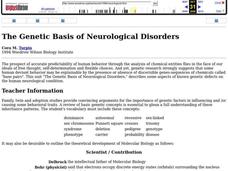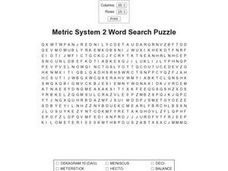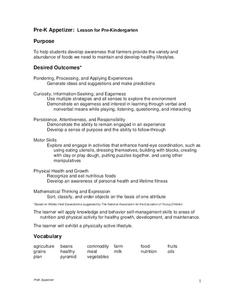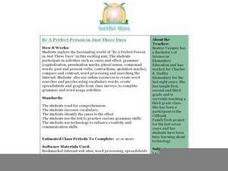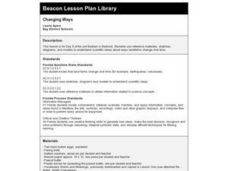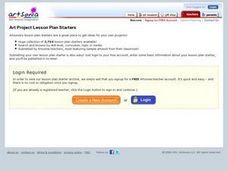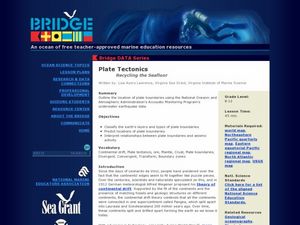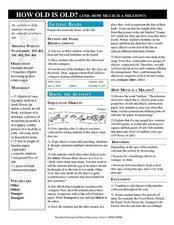Curated OER
The Genetic Basis of Neurological Disorders
Students explore neurological disorders. They examine the presence and absence of discernible genes. Students describe neruological diseases and draw faces of affected persons. They play a human neurology disorders learning game.
Curated OER
Unit 3 Cell Structures: Cell Theory & Organelles
Students examine cell structures in depth. They decide what grade they want to work for and do the assignments for that grade. They complete various assignments on cell theory and organelles.
Curated OER
Metric System 2 Word Search
In this measurement activity, students locate and identify various vocabulary terms related to science. There are ten words/phrases located in the puzzle.
Curated OER
Pre-K Appetizer
Students understand there are healthy and not healthy food choices. In this food pyramid lesson, students learn to make healthy choices by playing a traffic light game. Students recognize raw foods from the farm may not be ready for...
Curated OER
An Egg Studies Activity
In this eggs worksheet, students click on the links to learn about eggs, make a table about eggs, and answer short answer questions. Students complete 15 questions.
Curated OER
Newton's Laws of Motion
In this physics instructional activity, students identify and locate vocabulary terms related to Newton's Laws of Motion. There are 16 words located in the puzzle.
Curated OER
Christmas Fun Word Jumble
In this Christmas words worksheet, students unscramble the letters in 20 words pertaining to the Christmas season. There is a word bank.
Curated OER
Volcano
In this volcano worksheet, students use the riddle key to decode the answer to a question about the largest volcano. Students write the letters in the blank and read the answer.
Curated OER
Native Americans at Rose Bay
Students examine the Timken Native Americans of the 1400s and their culture of hunter-gatherers. They study the necessary vocabulary using a number of activities.
Curated OER
Language Arts: A "Perfect" Lesson
Students read "Be A Perfect Person in Just three days," and participate in a host of activities. Connected to technology, they use online sources to create word searches and puzzles from vocabulary words. In addition, students create...
Curated OER
Animals Secret Decoder Worksheet
In this animals worksheet, students use the letter key to match up to other letters to solve the code. Students solve the code for 15 different animals.
Curated OER
Fire Safety Secret Decoder
In this fire safety worksheet, students use a letter decoder key to determine 15 fire safety related words. A reference web site is included for additional activities.
Curated OER
Plants Word Scramble
In this plants worksheet, learners unscramble a set of 15 words related to plants. A reference web site is given for additional activities.
Curated OER
Recycling Word Scramble Worksheet
In this recycling worksheet, students unscramble a set of 15 words related to recycling. A reference web site is given for additional activities.
Curated OER
Investigating Sources-Artifacts
Students discuss artifacts. In this social science lesson, students realize that artifacts can help one in determining about the person the artifacts belonged to. Students will be put into small groups and will look at objects from a box...
Curated OER
Changing Ways
Third graders examine hard boiled eggs as possible models for the earth's layers.
Curated OER
It's A Jungle Out There!
Students report on an animal according to its appearance, habitat, and characteristics.
Curated OER
FORCES, MOTION, AND ENERGY
Eighth graders engage in a variety of activities in order to investigate the basic concepts of physics. They read and answer questions in a written text. This is only one type of activity that is part of many others.
Curated OER
Earth Day-Word Jumble
In this Earth Day activity, students unscramble 20 words related to Earth Day found in a word box at the bottom of the page. Worksheet has links to additional activities.
Curated OER
The Excursion
Students throw dice and make their way around a board, answering questions, performing tasks and finding out about the environment as they go.
Curated OER
How Do We Learn About the Past?
Sixth graders discuss the role of an archaeologist as a class. After viewing photographs, they relate the objects found in their local area and Ancient Egypt. They draw a picture of an object that represents their own culture and gives...
Curated OER
Plate Tectonics: Recycling the Seafloor
Students classify earth's layers and plates using Ocean Seismicity data. For this plate tectonics lesson, students outline where the plate boundaries are on the world map. They then compare these predicted boundaries with USGS map of the...
Curated OER
The Genetic Basis of Neurological Disorders
Students describe some aspects of known genetic defects on the human neurological condition. They participate in a variety of exercises including drawings, games, and analogies.
Desert Discoveries
How Old is Old? (And, How Much is a Million?)
Here is an interesting lesson on how old things are designed for young scientists. In it, learners compile a list of their birthdays, and the class puts them in sequential order from youngest to oldest. Then, they sequence 15 objects...


